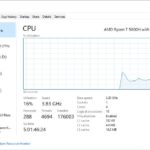IPS (In-Plane Switching) and LED (Light-Emitting Diode) monitors are two of the most popular types of computer monitors on the market today. But which one is right for you? In this post, we will break down the differences between IPS and LED monitors to help you decide.

Table of Contents
What is an IPS Monitor?
One type of monitor that has become increasingly popular in recent years is the IPS monitor. IPS stands for in-plane switching, and it refers to the way that the pixels on the screen are arranged.
Unlike traditional LCD screens, which have a fixed position for their pixels, IPS screens have pixels that can be rearranged. This allows for better color reproduction and wider viewing angles. IPS screens also tend to have higher refresh rates, which results in a smoother image.
For these reasons, IPS monitors are often used for gaming and other demanding applications.
What is a LED Monitor?
A LED monitor is a type of computer monitor that uses light-emitting diodes (LEDs) to backlight the display. The advantages of LED monitors over traditional LCD monitors include better energy efficiency, improved image quality, and thinner construction.
In terms of energy efficiency, LED monitors to consume about 30% less power than their LCD counterparts. This difference is due to the fact that LEDs require less power to produce the same amount of light as an LCD panel. As a result, LED monitors are more environmentally friendly and can help to reduce your energy bill.
In terms of image quality, LED monitors to offer superior contrast ratios and vibrancy. This is because LEDs emit a pure white light, which creates a more vibrant image.
LED monitors are thinner than LCD monitors since they do not require a backlight. This makes them ideal for use in space-restricted areas such as offices and dorm rooms.
IPS Monitors vs LED Monitors
Now that you know the basics of each type of monitor, let’s take a closer look at the differences between IPS and LED monitors.
Image Quality
IPS monitors are known for their exceptional image quality. IPS panels offer superior color reproduction.
LED monitors, on the other hand, typically have lower image quality than IPS monitors. LED backlighting can cause issues with screen uniformity and color accuracy.
However, there are some high-end LED monitors on the market that offer excellent image quality.
Viewing Angles
One of the biggest advantages of IPS monitors over LED monitors is their wider viewing angles. An IPS panel has a viewing angle of 178 degrees, while a typical LED monitor has a viewing angle of 160 degrees. This means that you can view an IPS monitor from a wider range of angles without losing image quality.
Price
IPS monitors are typically more expensive than LED monitors. However, the price difference has been narrowing in recent years as LED technology has become more affordable.
You can find IPS monitors at a variety of price points, from budget-friendly models to high-end, professional-grade displays.
LED monitors are also available at a range of prices, but you will generally get more bang for your buck with an LED monitor than with an IPS monitor.
Are IPS Monitors or LED Monitors Better for Gaming?
When it comes to choosing a gaming monitor, there are a few things you need to take into account. First and foremost is image quality. You want to make sure you’re getting the clearest, most vibrant picture possible. And that’s where IPS shines.
However, there are some factors to consider when choosing a monitor for gaming.
- If the image quality is your top priority, then an IPS monitor is the way to go. IPS panels offer superior color reproduction and wider viewing angles than LED panels.
- If you’re looking for a cheaper option, then an LED monitor is the better choice. LED monitors typically cost less than IPS monitors.
- If you want a thinner and more energy-efficient monitor, then an LED monitor is the better option. LED monitors to use less power than IPS monitors and are typically thinner due to their use of LED backlighting.



